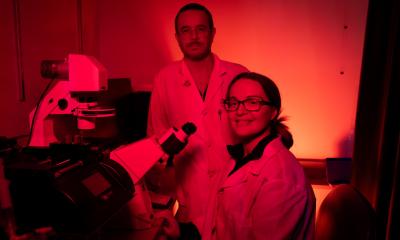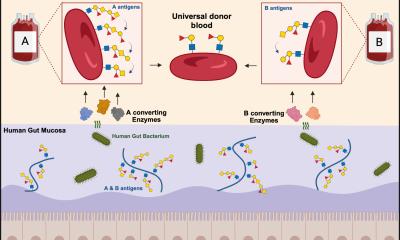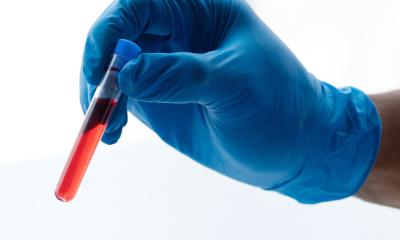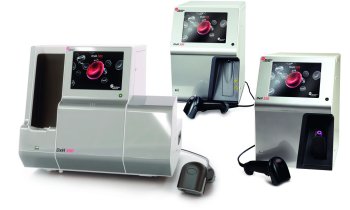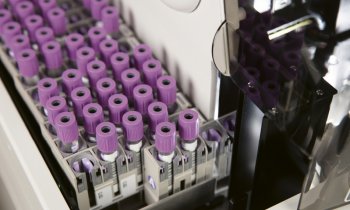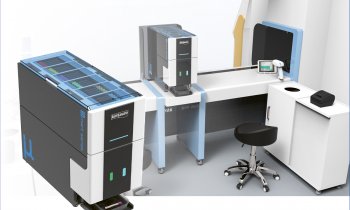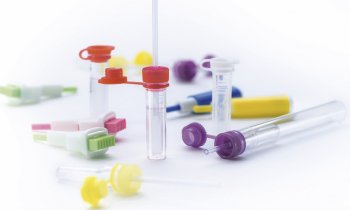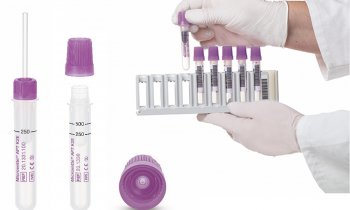© eranicle – stock.adobe.com
News • AnWj blood group antigen
MAL: new blood group system discovered
The discovery of a new blood group, MAL, has solved a 50- year-old mystery.
Researchers from NHS Blood and Transplant (Bristol), NHSBT’s International Blood Group Reference Laboratory (IBGRL) and the University of Bristol identified the genetic background of the previously known but mysterious AnWj blood group antigen. The findings allow identification and treatment of rare patients lacking this blood group. The new research, published by Blood, the journal of the American Society of Hematology, establishes a new blood group system (MAL), the 47th ever to be discovered, as home to the AnWj antigen.
Some people can lack this blood group due to the effect of illness, but the rare inherited form of the AnWj-negative phenotype has only been found in a handful of individuals – though due to this discovery it will now be easier to find others in the future.
The genetic background of AnWj has been a mystery for more than 50 years[...]. It represents a huge achievement, and the culmination of a long team effort, to finally establish this new blood group system and be able to offer the best care to rare, but important, patients
Louise Tilley
The two best known blood group systems are ABO and Rh, but blood is more complex and matching across the other groups can be lifesaving. If people who are AnWj-negative receive AnWj-positive blood, they could have a transfusion reaction, and this research allows development of new genotyping tests for detecting such rare individuals and reducing the risk of transfusion-associated complications. The AnWj antigen – an antigen is a surface marker – was discovered in 1972 but its genetic background was unknown until now.
The research team established that AnWj is carried on the Mal protein. More than 99.9% of people are AnWj-positive, and such individuals were shown to express full-length Mal protein on their red cells, which was not present on the cells of AnWj-negative individuals. The team identified homozygous deletions in the MAL gene associated with the inherited AnWj-negative phenotype. The most common reason for being AnWj-negative is due to suffering from a haematological disorder or some types of cancer which suppress antigen expression. Only a very small number of people are AnWj-negative due to a genetic cause. There were five genetically AnWj negative individuals in the study including a family of Arab-Israelis. The blood tested included a sample given by a lady in 2015 who was the first AnWj negative person to be discovered in the 1970s.
The research team used whole exome sequencing – the genetic sequencing of all DNA that encodes proteins – to show that these rare inherited cases were caused by homozygous DNA sequence deletions in the MAL gene, which codes for Mal protein. Proof that Mal is responsible for binding of AnWj antibodies isolated from these rare patients was provided by experiments showing the appearance of specific reactivity with cells in which researchers introduced the normal MAL gene but not the mutant gene.
Louise Tilley, Senior Research Scientist, IBGRL Red Cell Reference at NHS Blood and Transplant, said: “The genetic background of AnWj has been a mystery for more than 50 years, and one which I personally have been trying to resolve for almost 20 years of my career. It represents a huge achievement, and the culmination of a long team effort, to finally establish this new blood group system and be able to offer the best care to rare, but important, patients. The work was difficult because the genetic cases are very rare. We would not have achieved this without exome sequencing, as the gene we identified wasn’t an obvious candidate and little is known about Mal protein in red cells. Proving our findings was challenging, and we appreciate the help of all our collaborators, and the patients, without whom we would not have got to this point.”
Recommended article
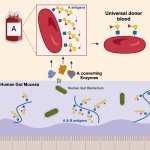
News • Transfusion medicine
One step closer to universal donor blood
Donor blood is a scarce and valuable resource. Researchers aim to mitigrate this by using enzymes to remove specific sugars that make up the A and B antigens in the human ABO blood groups.
Ash Toye, Professor of Cell Biology in the School of Biochemistry and Director of the NIHR Blood and Transplant Research Unit in red cell products at the University of Bristol, said: “It’s really exciting we were able use our ability to manipulate gene expression in the developing blood cells to help confirm the identity of the AnWj blood group, which has been an outstanding puzzle for half a century. This development will help identify these rare donors and help patients in the future.”
Nicole Thornton, Head of IBGRL Red Cell Reference at NHS Blood and Transplant, said: “Resolving the genetic basis for AnWj has been one of our most challenging projects. There is so much work that goes into proving that a gene does actually encode a blood group antigen, but it is what we are passionate about, making these discoveries for the benefit of rare patients around the world. Now genotyping tests can be designed to identify genetically AnWj-negative patients and donors. Such tests can be added to the existing genotyping platforms.”
Dr Tim Satchwell, Senior Lecturer at UWE Bristol, who contributed to the study whilst a Research Fellow at the University of Bristol, said: “Mal is a very small protein with some interesting properties which made it difficult to identify and meant we needed to pursue multiple lines of investigation to accumulate the proof we needed to establish this blood group system. Being able to combine our expertise to finally achieve this has brought the whole team a lot of satisfaction.”
Source: University of Bristol
17.09.2024



